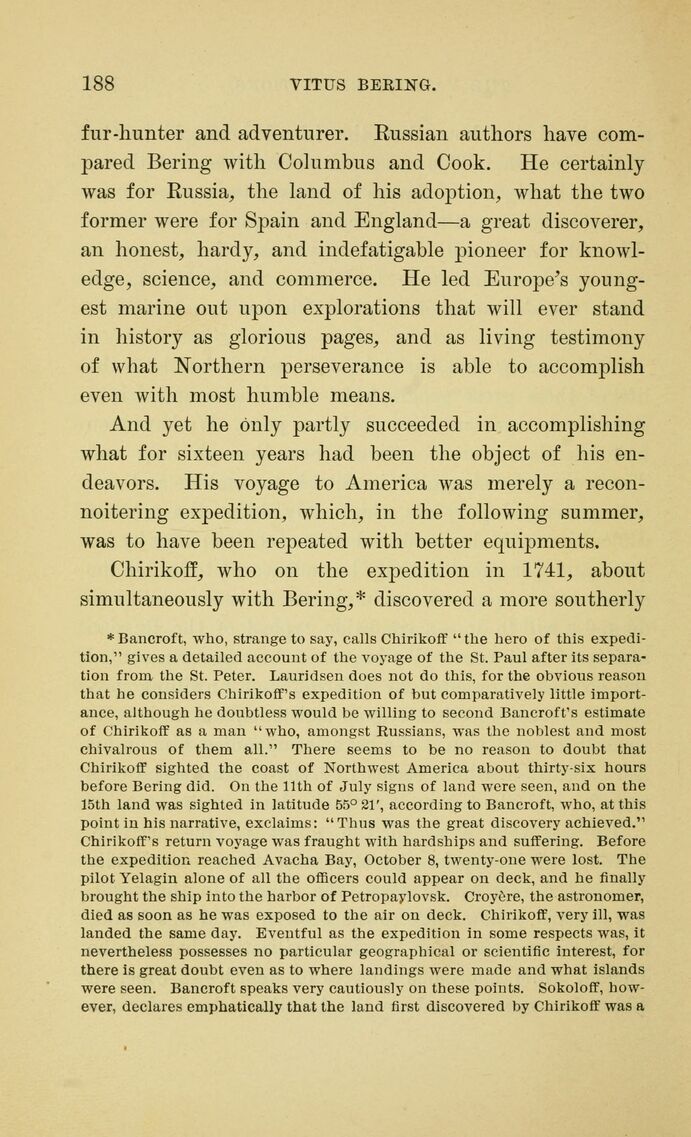
Full resolution (JPEG)
- On this page / på denna sida
- Chapter XIX.

<< prev. page << föreg. sida << >> nästa sida >> next page >>
Below is the raw OCR text
from the above scanned image.
Do you see an error? Proofread the page now!
Här nedan syns maskintolkade texten från faksimilbilden ovan.
Ser du något fel? Korrekturläs sidan nu!
This page has been proofread at least once.
(diff)
(history)
Denna sida har korrekturlästs minst en gång.
(skillnad)
(historik)
fur-hunter and adventurer. Russian authors have
compared Bering with Columbus and Cook. He certainly
was for Russia, the land of his adoption, what the two
former were for Spain and England—a great discoverer,
an honest, hardy, and indefatigable pioneer for
knowledge, science, and commerce. He led Europe’s
youngest marine out upon explorations that will ever stand
in history as glorious pages, and as living testimony
of what Northern perseverance is able to accomplish
even with most humble means.
And yet he only partly succeeded in accomplishing
what for sixteen years had been the object of his
endeavors. His voyage to America was merely a
reconnoitering expedition, which, in the following summer,
was to have been repeated with better equipments.
Chirikoff, who on the expedition in 1741, about
simultaneously with Bering,[1] discovered a more southerly
[1] Bancroft, who, strange to say, calls Chirikoff “the hero of this expedition,” gives a detailed account of the voyage of the St. Paul after its
separation from the St. Peter. Lauridsen does not do this, for the obvious reason
that he considers Chirikoff’s expedition of but comparatively little
importance, although he doubtless would be willing to second Bancroft’s estimate
of Chirikoff as a man “who, amongst Russians, was the noblest and most
chivalrous of them all.” There seems to be no reason to doubt that
Chirikoff sighted the coast of Northwest America about thirty-six hours
before Bering did. On the 11th of July signs of land were seen, and on the
15th land was sighted in latitude 55° 21′, according to Bancroft, who, at this
point in his narrative, exclaims: “Thus was the great discovery achieved.”
Chirikoff’s return voyage was fraught with hardships and suffering. Before
the expedition reached Avacha Bay, October 8, twenty-one were lost. The
pilot Yelagin alone of all the officers could appear on deck, and he finally
brought the ship into the harbor of Petropavlovsk. Croyère, the astronomer,
died as soon as he was exposed to the air on deck. Chirikoff, very ill, was
landed the same day. Eventful as the expedition in some respects was, it
nevertheless possesses no particular geographical or scientific interest, for
there is great doubt even as to where landings were made and what islands
were seen. Bancroft speaks very cautiously on these points. Sokoloff,
however, declares emphatically that the land first discovered by Chirikoff was a slight projection of the coast between Capes Addington and Bartholomew of
Vancouver’s map. Moreover, the lands in these regions received no names
from the St. Paul, whereas the St. Peter forged, along the islands of the
North Pacific, a chain of names, many of which are still the permanent
possession of geography. When it is furthermore remembered that Chirikoff
was one of Bering’s assistants, that the fitting out of the expedition was
under the charge of Bering, and that upon him rested all responsibility to the
government, it is certainly impossible for any fair-minded person to accept
the statement that Chirikoff “must ever be regarded as the hero of this
expedition.” Bancroft does not, however, approve of Sokoloff’s
vainglorious expressions concerning “the achievements of Chirikoff, a true
Russian, as against Bering the Dane.” Principally in the one fact of a few
hours’ priority of discovery, Solokoff finds proof of “the superiority of the
Russians in scientific navigation!” Bancroft occasionally reminds the
reader that “Russian historians are perhaps a little inclined to magnify the
faults of Bering the Dane,” and in this instance administers to Sokoloff the
following reproof: “So the learner is often apt to grow bold and impudent
and despise the teacher. The great Peter was not above learning navigation
from Bering the Dane.” In speaking of Bering’s death, Bancroft further
retrieves himself—indeed, seems quite to supersede his former opinion—
by saying: “Thus passed from earth, as nameless tens of thousands have
done, the illustrious commander of the expeditions which had disclosed the
separation of the two worlds and discovered north-westernmost America.”
See History of Alaska, p. 68 et seq.—Tr.
<< prev. page << föreg. sida << >> nästa sida >> next page >>
Project Runeberg, Tue Dec 12 13:56:47 2023
(aronsson)
(diff)
(history)
(download)
<< Previous
Next >>
https://runeberg.org/vjberingen/0210.html



